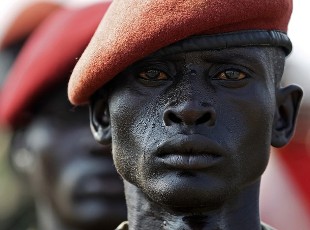Kiir orders troop deployment to border areas with Sudan
February 12, 2013 (JUBA) – South Sudan’s president, Salva Kiir has ordered the urgent and coordinated deployment of joint police and government troops to border areas with Sudan amid fears of a possible incursion, according to a broadcast by the state-owned South Sudan Television (SSTV) on Tuesday.

The president gave the orders during a security briefing with the Sudan People’s Liberation Army’s (SPLA) chief of general staff, General James Hoth Mai, inspector-general of police General Pieng Deng Kuol and Unity state governor Taban Deng Gai.
Gai, who briefed the president on the general security situation, as well as current developments, described the meeting as “fruitful and decisive”.
“The government of Sudan is building up troops and using militia groups to attack areas along the border in Unity. The president has positively responded and has asked the chief of general staff and the inspector-general of police to deploy forces to all the border areas so that they provide security and protection of the citizens”, Gai said.
Speaking at a press conference in Juba, South Sudan’s deputy defence minister Majak D’Agoot described the build-up of forces along border areas in the last two months as “unusual”.
“Our forces are in the state of maximum readiness to repel any attack by Khartoum. We will stay in our current positions, we will keep to the terms of the [September] agreement”, D’Agoot was quoted as saying by Al Jazeera.
SSTV showed pictures of the president in discussions at the meeting with Pagan Amum, the secretary-general of the governing Sudan People’s Liberation Movement (SPLM).
There has been no official statement from Amum or the president about the details of the meeting, although SSTV reported the pair discussed the failure of talks with Sudan and preparations for the convening of the forthcoming extraordinary national convention of the SPLM to discuss a document regarding the basic rules and regulations governing the SPLM as a party.
The African Union-brokered peace deal in September aimed to defuse tensions between the Sudans, however, both nations have failed to set up a demilitarised border zone which would allow for the resumption of oil exports from the landlocked South through Sudanese pipelines, as was agreed in Addis Ababa.
The two countries came close to war last April in the worst border clashes since South Sudan seceded in July 2011 under a peace agreement that ended decades of civil war.
A series of meetings last month in the Ethiopian capital with an AU-led mediation team failed to resolve the contentious issues of Abyei and contested border areas.
Khartoum maintains that there can be no resolution on any of the sticking points agreed in the peace deal unless Juba ends its alleged support to the rebel Sudan People Liberation Movement North (SPLM-N) fighting the Sudanese army in the border states of South Kordofan and Blue Nile.
Landlocked South Sudan was meant to resume oil production last November with the first exports to hit markets by January. But Sudan’s insistence on implementing security arrangements first hindered the resumption of oil production in the newborn nation.
(ST)
